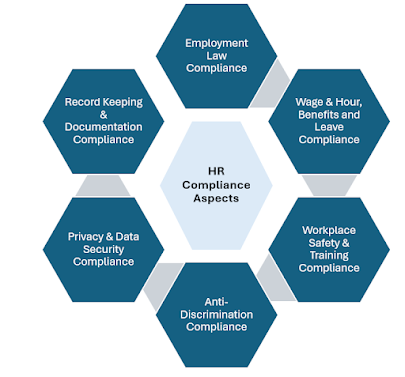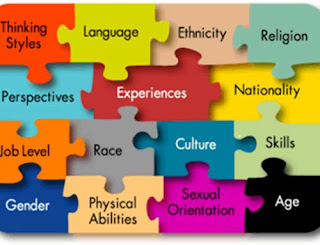Managing Global HR Regulatory Compliance: Legal Landscapes in a on a connected world
Implications of HR Compliances in a Global Context
Ensuring HR compliance us essential for maintaining an organization's legitimacy and ensuring the safety of all employees within the organization. A dedicated Human Resources Compliance team or an appointed HR employee is responsible for managing a variety of federal & state laws and regulations to reduce the company's legal risks. By doing so, HR can help prevent potential liabilities and scandals that could harm the businesses reputation. An important aspect of HR Compliance is bridging the gap between the company's growth trajectory and objectives and the compliance practices that impact activities such as hiring, employee development and retention. Achieving a balance between HR strategy and compliance often begins with establishing a clearly defined set of goals.
What is HR Compliance?
HR compliance involves developing policies and procedures to ensure that an organization complies with current labor and employment laws and regulations in the operating area of the business. HR not only aligns workplace policies with local and federal laws but also enforces procedures to ensure all employees adhere to them. HR Compliance is crucial for businesses as all employers must fulfil their legal obligations. Non-compliance can result in fines, penalties or lawsuits that can significantly impact a business Therefore, HR leaders must prioritize HR compliance to safeguard their organization.
 |
| Figure 1: Types of HR Compliance, created by author |
Statutory Compliance:
Statutory compliance involves implementing and adhering to government legislation related to employment and the workplace. For instance, companies are obligated to comply with laws regarding minimum wage working age requirements and anti-discrimination among others.
Regulatory Compliance:
Regulatory compliance sometimes intersects with statutory compliance. But the key difference is that companies must adhere to the regulations set by a specific regulatory body, such as; Independent Regulatory Commission's, Executive agencies and government corporations.
Contractual Compliance:
Contractual compliance is exactly what it sounds like - The adherence to regulations and terms that your organization is obligated to follow. This can involve contracts between your company and partner organizations, as well as agreements with the employees.
Union Law Compliance:
Some companies may engage with union workers. In such cases, it is crucial for the company to understand and comply with the rules established by these unions.
HR Compliance Aspects:
 |
| Figure 2: HR Compliance Aspects, created by author |
1. Employment Law Compliance
Adhering to laws related to;- Hiring
- Employment Contracts
- Termination
2. Wage & Hour, Benefits and Leave Compliance
- Adhering to laws governing;
- Minimum wage
- Overtime Pay
- Classification of employees
- Health insurance
- Retirement plans
- Leave laws (Family & Medical leave, Annual Leave, Sick Leave etc.)
3. Workplace safety & Training Compliance
Complying with occupational health & safety regulations to prevent workplace injuries and illnesses. Providing compliance requirements, such as; sexual harassment prevention training and safety training.
4. Anti-Discrimination Compliance
Complying with laws and regulations to prevent and address discrimination, harassment, retaliation.
5. Privacy & Data Security Compliance
Complying with data privacy laws & regulations.
6. Record keeping & Documentation Compliance
Maintaining accurate records related to employee information, payroll, benefits, performance evaluations, compliance trainings etc.
Why is HR Compliance so important?

Overall, HR compliance is critical for ensuring legal adherence, protecting employees, managing risks, enhancing reputation of an organization, improving operational efficiency and gaining competitive advantage in the marketplace.
How to ensure of consistent HR compliance?
Ensuring HR compliance is a comprehensive process that needs many steps to be followed proactively and consistently. Briefly summarized as a continuous cycle as below:
 |
| Figure 3: Compliance checklist HR, created by author |
Conclusion:
HR compliance is a pivotal aspect in any organization management that involves many stakeholders, strategies and processes. Many theories such as, Legal compliance theory, Ethical compliance theory, Risk Management theory & Strategic compliance theory or more could be and should be considered in each organizational approach to ensure the correct practices of HR compliance is implemented within the business. This will secure continuous performance of an organization without legal, social or resource hindrances. Any risk or requirement that arises within the organization should be non-hesitantly and proactively addressed to ensure the safety and security of all employees, sustainable growth of the company, business reputation and long-term success.
References:
1. Storey, J. & Wright, P. (2005) - Strategic Human Resource Management. Routledge.
2. Beluchi C. Nwanisobi, Inienger C. (2020) - Talent Management: A conceptual framework with practical approach (IJRRCEM)
3. Brougham A. (2023) - What is HR compliance and why is it important? https://www.breathehr.com/en-gb/blog/topic/employment-law/what-is-hr-compliance-and-why-is-it-important (Online)
4. Consentio J. - HR Compliance: A Practical Guide - https://www.aihr.com/blog/hr-compliance/(Online)




ReplyDeleteInsightful exploration of HR compliance. Clear breakdown of key aspects. Practical guidance for effective implementation.
Managing global HR regulatory compliance requires vigilance amidst interconnected legal landscapes. Harmonizing policies with international laws ensures ethical practices, mitigates risks, and fosters trust. By prioritizing compliance, organizations navigate complexities, safeguarding both employees and their global reputation.
ReplyDeleteThat is one of main factor of international HR function complaince to success the organization.
ReplyDeleteThis blog post provides a thorough examination of the importance of HR compliance in a global context, outlining key aspects, types, and implications of compliance within organizations. By addressing various compliance areas such as statutory, regulatory, contractual, and union law compliance, the post offers valuable insights into the multifaceted nature of HR compliance and its significance in mitigating legal risks and safeguarding employee rights. Furthermore, the inclusion of practical strategies for ensuring consistent HR compliance enhances the relevance and applicability of the content to real-world organizational settings.
ReplyDeleteYour comprehensive breakdown of the various types of compliance and their implications underscores the critical role HR plays in safeguarding organizational integrity.
ReplyDeleteThis article pointing out HR compliance is vital for organizations to uphold legality, protect employees, and mitigate risks. It involves aligning policies with laws to prevent penalties and lawsuits. Key aspects include statutory, regulatory, contractual, and union law compliance. Ensuring consistency requires proactive efforts and incorporation of various strategies and theories. Ultimately, prioritizing HR compliance safeguards success and reputation globally.
ReplyDelete